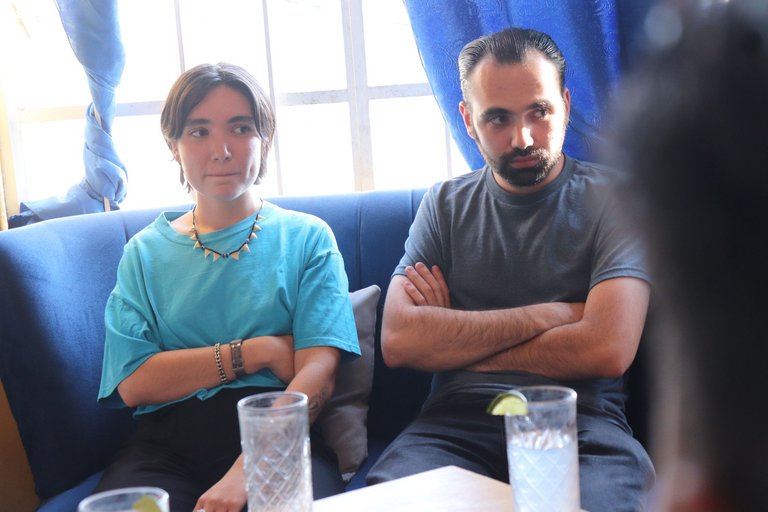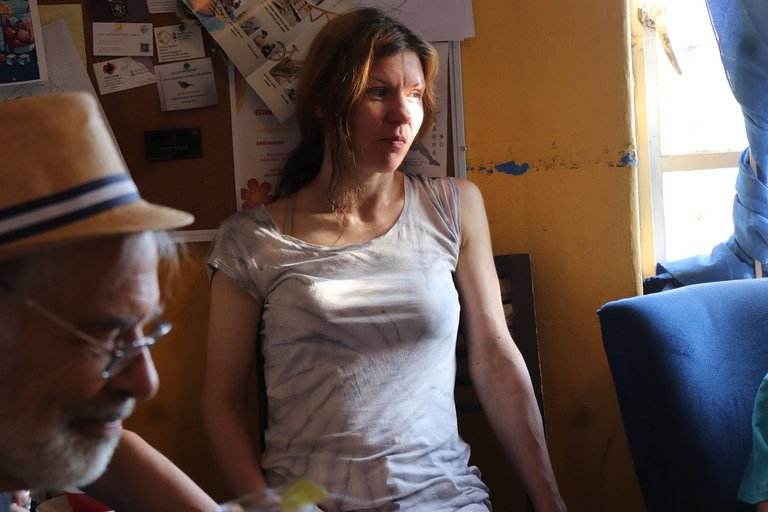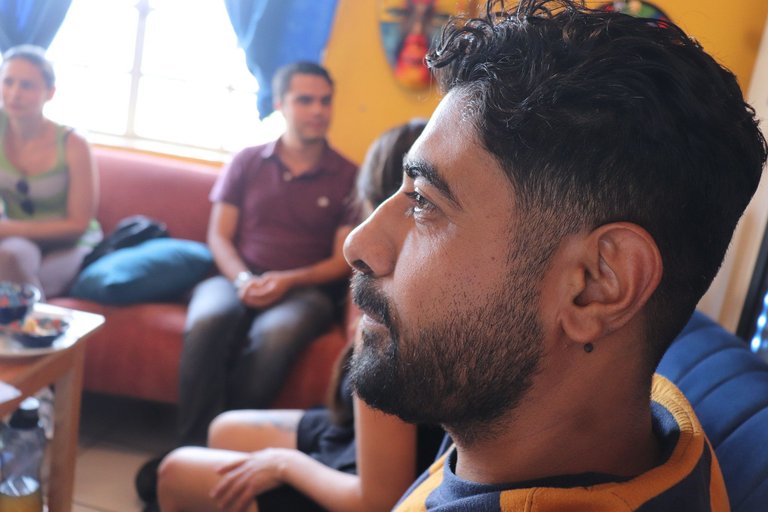Good afternoon. In these posts I'm describing the process of developing the concept and execution of my sober bar.
In my first post I told you a little about me and the history of sober bars, in the second post some of the conversations I had and the books I read to develop my vision. In the third post I talked about how I came up with the name "El Sentido", and also some of the problems with alcoholic bars.
In this post I'd like to talk about what I imagined as the solution, a sober bar where people can enjoy themselves with wholesome and healthy activities.
Here's a photo of a companion, Sofía, during a language exchange:

Human Interaction
I wrote these words some time around February 12, 2024.
I have fond memories of going to Crossways, the Hare Krishna restaurant in downtown Melbourne. The food is vegetarian, kirtans are always being played in the background to set a context of holiness, and the tables seat 10-20 people each, meaning that you will often sit with strangers. Many times in this place I sat down and had interesting conversations about philosophy, spirituality, and life in general with people there. I believe that this class of atmosphere can be recreated, and even improved.
At time of writing, Crossways still exists and has for 30 years. Looking back now, it still seems a phenomenon, an unusual atmosphere even among Vaishanava restaurants. I recall my meals and conversations there fondly. As they say in Latin American memes "I was happy and I didn't know it."
In sociology, there is the concept of the “third place”. The first place is the home, the second place is the workplace, and the third place is, well, somewhere else. It is a place where people can come regularly, where conversation is the main activity, a neutral place with no obligation, that feels comfortable, with no differentiation in status. In many societies, barber shops and beauty salons serve this purpose, as well as churches. In Latin America, many plazas serve as third places, but they don’t necessarily have the open invitation to converse that can be made more explicit in a business, or where people are more concentrated.
Again I referenced The Great Good Place by sociologist Ray Oldenburg. There are many cafés throughout the world that put up signs saying "We don't have wifi; talk to each other!" But a simple command is rarely enough to establish conversation. At one point in the book, Mr. Oldenburg talks about how many bars have been restored to greatness simply by good hosting. When a new companion enters the bar, the barkeep finds out his name and a little about his interests. Then he can find a way to introduce him to others. By basic techniques, applied consistently, a culture of conversation can be cultivated.
One personal experience comes to mind. Nineteen years ago I walked into a bar in Melbourne, owned by the hostel I was staying at. The barman asked my name and introduced me to two other fellows sitting at the bar. I can hardly recall a time it happened before or since, and it's still marked in my memory. Many great things begin with those words "My name is Dave; what's yours?"
In linguistics, “phatic communication” is a term to refer to communication that is only used for social purposes, without necessarily having an informational intent. For example, if two people are seated at a bus stop for five minutes, it will be common to hear one of them commenting on the weather. Even in large cities which can be notoriously cold in regards to social interactions, people still have a deep desire to meet their social needs. So it is natural and common for people to begin social interactions when they are seated in close proximity.
Originally I intended to have communal tables laid out in a similar way to Crossways - or you might think of a German beer hall. Every space would be set out to encourage people to sit next to each other, and to break the tension they would likely start a conversation.
With contemplation and experimentation, it developed very differently - now almost every room in El Sentido looks like a living room, to the extent where people walk in and say "Is this the bar? It looks like your home." And people do feel at home here.
Here is a photo of two companions at a language exchange, Maggie and Axel:

In many societies today, people have lost faith in institutions which previously formed their bases. People trust governments, media, their employers, medical bodies and even religious organizations less than ever. This results in a form of alienation and a sense of purposelessness which is named by John Vervaeke “the meaning crisis”. Perhaps this is, in part, the reason establishments which implicitly or explicitly promote short-term pleasure seem appealing to many.
In the area of technology, there is a trend of decentralization. Many projects depend on various distributed efforts instead of focused efforts of one institution, with varying structures and varying levels of success. Some of these projects include Linux and associated open-source software, Wikipedia, and Bitcoin. In some sense, we can say that the modern process of “waking up” is the acceptance that large media sources are no longer trustworthy, and one must form conclusions based on disparate sources of various political affiliations, methods, and levels of trustworthiness - and, of course, based on one’s own thinking.
I used the term "waking up" here - it's a reference to the full title of Professor Vervaeke's lecture series - Awakening from the Meaning Crisis.
It's curious to ponder that I would start this project here in Latin America. Here, many still believe in the Catholic Church as an institution, and the teachings of Christ. Whatever criticisms I had of Catholicism have surely been overpowered by the blessings I have received from devout Catholics.
However, I can already see the influences that have so much power in the English-speaking world, now taking hold in Mexico. When we can be exposed to different viewpoints, in a place with a culture of respectful dialogue, a lot of these ideas will not survive.
During the “pandemic” in Britain, one of the first businesses to receive a mandate to close were the public houses, which, for a long time, have been the places to foment revolutions, or at least to discuss matters in order to find truth.
Therefore, a place where people can discuss issues relevant to society, where people can present differing viewpoints, where people are not categorized by status, where they can form conclusions based upon hearing information from varied sources, is surely valuable in helping a society form meaning, and remember what is truly important.
See you next time
In the following post I'd like to talk about how I started putting my ideas into action, finding a locale, renting it and remodelling it, and how I applied my ideas in a practical way.
Ahora en español
Buenas tardes. En estas publicaciones estoy describiendo el proceso de desarrollar el concepto y la ejecución de mi bar sobrio.
En mi primera publicación te conté un poco sobre mí y la historia de los bares sobrios, en la segunda algunas de las conversaciones que tuve y los libros que leí para desarrollar mi visión. En la tercera publicación hablé de cómo surgió el nombre "El Sentido", y también de algunos de los problemas con los bares que sirven alcohol.
En esta publicación me gustaría hablar de lo que imaginé como la solución: un bar sobrio donde las personas puedan disfrutar de actividades sanas y saludables.
Aquí hay una foto de una compañera, Monique, en un intercambio de idiomas en el bar sano:

Interacción Humana
Escribí estas palabras alrededor del 12 de febrero de 2024.
Tengo gratos recuerdos de Crossways, el restaurante Hare Krishna en el centro de Melbourne. La comida es vegetariana, siempre hay kirtans sonando de fondo para crear un ambiente de santidad, y las mesas tienen capacidad para 10 a 20 personas, lo que significa que a menudo te sientas junto a desconocidos. Muchas veces en ese lugar me senté y tuve conversaciones interesantes sobre filosofía, espiritualidad y la vida en general con otras personas. Creo que este tipo de atmósfera se puede recrear, e incluso mejorar.
Al momento de escribir esto, Crossways sigue existiendo y lleva 30 años en funcionamiento. Al mirar atrás, sigue pareciéndome un fenómeno, una atmósfera inusual incluso entre los restaurantes vaishnavas. Recuerdo con cariño mis comidas y conversaciones ahí. Como dicen en los memes latinoamericanos: “Era feliz y no lo sabía.”
En sociología existe el concepto del "tercer lugar". El primer lugar es el hogar, el segundo lugar es el trabajo, y el tercer lugar es, bueno, otro sitio. Es un espacio donde las personas pueden ir con regularidad, donde la conversación es la actividad principal, un lugar neutral, sin obligaciones, cómodo y sin diferenciaciones de estatus. En muchas sociedades, las barberías y los salones de belleza cumplen esta función, así como las iglesias. En América Latina, muchas plazas públicas actúan como terceros lugares, pero no siempre tienen esa invitación abierta a conversar que puede hacerse más explícita en un negocio, o donde las personas estén más concentradas.
Aquí volví a hacer referencia a The Great Good Place del sociólogo Ray Oldenburg. Hay muchos cafés en todo el mundo que ponen carteles diciendo: “No tenemos wifi; ¡hablen entre ustedes!” Pero una simple orden rara vez basta para generar conversación. En un punto del libro, el Sr. Oldenburg explica cómo muchos bares han sido restaurados a su grandeza simplemente a través de un buen anfitrión. Cuando un nuevo cliente entra al bar, el encargado averigua su nombre y un poco sobre sus intereses, y entonces encuentra la manera de presentarlo a otros. Con técnicas básicas, aplicadas consistentemente, se puede cultivar una cultura de conversación.
Me viene a la mente una experiencia personal. Hace diecinueve años entré a un bar en Melbourne, propiedad del hostal donde me hospedaba. El barman me preguntó mi nombre y me presentó a dos personas que estaban sentadas en la barra. No recuerdo otra ocasión en que haya pasado algo así antes o después, y sigue siendo un recuerdo marcado en mi memoria. Muchas grandes cosas comienzan con esas palabras: “Me llamo Dave, ¿y tú?”
En lingüística, la "comunicación fática" es un término que se refiere a la comunicación que se usa solo con fines sociales, sin una intención necesariamente informativa. Por ejemplo, si dos personas están sentadas en una parada de camión durante cinco minutos, es común que una de ellas comente algo sobre el tiempo. Incluso en las grandes ciudades, que suelen ser famosas por su frialdad en las interacciones sociales, las personas aún tienen un profundo deseo de satisfacer sus necesidades sociales. Por eso es natural y común que comiencen interacciones sociales cuando están en cercanía física.
Originalmente tenía la intención de colocar mesas comunales de manera similar a Crossways —o podrías pensar en un salón cervecero alemán. Todo el espacio estaría diseñado para fomentar que las personas se sienten juntas y, para romper la tensión, probablemente comenzarían una conversación.
Con el tiempo, y tras reflexionar y experimentar, el diseño evolucionó de forma muy distinta: ahora casi todas las salas de El Sentido parecen salas de estar, al grado que la gente entra y dice: “¿Este es el bar? Parece tu casa.” Y efectivamente, aquí las personas se sienten como en casa.
Aquí hay una foto del compañero Azaz en un intercambio de idiomas:

En muchas sociedades actuales, las personas han perdido la fe en las instituciones que antes formaban su base. La confianza en los gobiernos, los medios de comunicación, los empleadores, los organismos médicos e incluso en las organizaciones religiosas está más baja que nunca. Esto genera una forma de alienación y una sensación de falta de propósito que el profesor John Vervaeke llama “la crisis del sentido”. Tal vez esta sea, en parte, la razón por la que los establecimientos que promueven placeres efímeros, ya sea de manera implícita o explícita, resultan atractivos para muchos.
En el área de la tecnología, existe una tendencia a la descentralización. Muchos proyectos dependen de esfuerzos distribuidos, en lugar de esfuerzos concentrados en una sola institución, con estructuras y niveles de éxito variados. Algunos ejemplos son Linux y el software de código abierto, Wikipedia y Bitcoin. En cierto sentido, podemos decir que el proceso moderno de "despertar" implica aceptar que los grandes medios ya no son confiables, y que uno debe formar sus propias conclusiones a partir de fuentes diversas, con distintas afiliaciones políticas, métodos y niveles de confiabilidad —y, por supuesto, basándose en el propio pensamiento.
Utilicé el término "despertar" aquí —es una referencia al título completo de la serie de conferencias del profesor Vervaeke: Awakening from the Meaning Crisis (Despertando de la Crisis del Sentido).
Es curioso pensar que comenzaría este proyecto aquí en América Latina. Aquí, muchas personas aún creen en la Iglesia Católica como institución, y en las enseñanzas de Cristo. Cualesquiera críticas que haya tenido hacia el catolicismo han sido superadas por las bendiciones que he recibido de católicos devotos.
Sin embargo, ya puedo ver cómo las influencias que dominan el mundo angloparlante están llegando a México. Cuando podemos estar expuestos a diferentes puntos de vista, en un lugar donde exista una cultura de diálogo respetuoso, muchas de esas ideas no lograrán prosperar.
Durante la "pandemia" en el Reino Unido, uno de los primeros negocios que recibieron la orden de cerrar fueron las casas públicas (pubs), que durante mucho tiempo han sido lugares donde se fomentan revoluciones, o al menos donde se discuten asuntos importantes en búsqueda de la verdad.
Por tanto, un lugar donde las personas puedan discutir temas relevantes para la sociedad, donde se presenten puntos de vista diversos, donde no haya jerarquías de estatus, y donde se puedan formar conclusiones al escuchar información de múltiples fuentes, sin duda es valioso para ayudar a una sociedad a encontrar sentido y recordar lo que realmente importa.
Nos vemos en la próxima
En la siguiente publicación me gustaría hablar sobre cómo empecé a poner mis ideas en acción: encontrar un local, rentarlo y remodelarlo, y cómo apliqué mis ideas de manera práctica.

